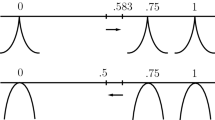Abstract
This paper presents a dynamic model on lobbying. The interactions between two competing lobbies, who attempt to influence regulations and legislation, are modelled as a differential game. We consider for this game first a time consistent and then a subgame perfect equilibrium (in linear Markov strategies). The subgame perfect equilibrium lowers considerably lobbying activity and expenses. This provides a partial explanation of the puzzle that rent-seeking expenses are often small compared with the prize sought.
Similar content being viewed by others
References
Basar, T. and Olsder, G.J. (1982).Dynamic noncooperative game theory. London: Academic Press.
Becker, G.S. (1983). A theory of competition among pressure groups for political influence.Quarterly Journal of Economics 98: 371–400.
Evans, D.S. (1983),Breaking up Bell. Amsterdam: North Holland.
Brooks, M.A. and Heijdra B.J. (1988). In search of rent-seeking. In C.K. Rowley, R.D. Tollison and G. Tullock (Eds.),The political economy of rent seeking, 27–49. Boston: Kluwer Academic Publishers.
Cairns, R.D. (1989). Dynamic rent seeking.Journal of Public Economics 39: 315–334.
Frey, B.S. (1984).International political economics. Oxford: Basil Blackwell.
Krueger, A.O. (1974). The political economy of the rent-seeking Society.American Economic Review 64: 291–303.
Laband, D.N. and Sophocleus, J.D. (1988). The social cost of rent seeking: First estimates.Public Choice 58: 269–275.
Leininger, W. and Yang, C.L. (1990). Dynamic rent-seeking games. Universität Dortmund. Mimeo (Nr. 90-08).
Mehlmann, A. (1988).Applied differential games. New York and London: Plenum Press.
Monissen, H.G. (1991). Rent-seeking in general equilibrium: A didactic illustration.Public Choice 72: 111–129.
Posner, R.A. (1975). The social costs of monopoly and regulation.Journal of Political Economy 83: 807–827.
Reynolds, S.S. (1987). Capacity investment, pre-emption and commitment in an infinite horizon model.International Economic Review 28: 69–88.
Rowley, C.K., Tollison, R.D. and Tullock, G. (1988).The political economy of rent seeking. Boston: Kluwer Academic Publishers.
Selten, R. (1975). Re-examination of the perfectness concept for equilibrium points in extensive games.International Journal of Game Theory 4: 25–55.
Tollison, R.D. (1989). Superdissipation.Public Choice 61: 97–98.
Tullock, G. (1967). The welfare costs of tariffs, monopolies and theft.Western Economic Journal 5: 224–232.
Tullock, G. (1989).The economics of special privilege and rent seeking. Boston: Kluwer Academic Publishers.
Ursprung, H.W. (1990). Public goods, rent dissipation, and candidate competition.Economics and Politics 2: 115–132.
Waldow, K.H. (1989). Dynamic aspects of lobbying. Paper presented at the European Annual Meeting of the Public Choice Society, University of Linz (Austria), 29 March–1 April 1989.
Wenders, J.T. (1987). On perfect rent dissipation.American Economic Review 77: 456–459.
Yang, C.L. (1991). Cooperation by credible threats: On social cost of transfer contest under uncertainty. Universität Dortmund, Mimeo (Nr. 91-06).
Author information
Authors and Affiliations
Additional information
The author acknowledges helpful comments from an anonymous referee.
Rights and permissions
About this article
Cite this article
Wirl, F. The dynamics of lobbying — A differential game. Public Choice 80, 307–323 (1994). https://doi.org/10.1007/BF01053223
Accepted:
Issue Date:
DOI: https://doi.org/10.1007/BF01053223



